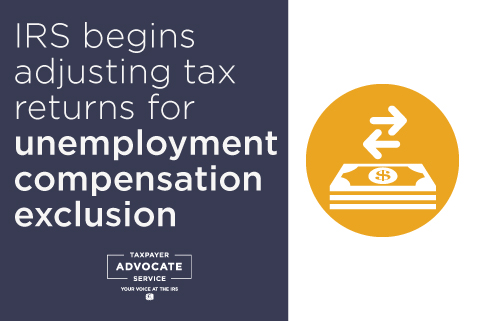On May 14, the IRS issued notification that it began making adjustments to 2020 tax returns to allow the exclusion of unemployment compensation of up to $10,200, as included in the American Rescue Plan Act of 2021.
Here’s some quick facts you need to know:
- The adjustments will be done in phases.
- The first phase, began on May 6, 2021, and includes single taxpayers who had the simplest tax returns, such as those filed by taxpayers who did not claim children or any refundable tax credits.
- The second phase is scheduled to begin after the completion of the first phase and will include married filing joint taxpayers with more complex tax returns.
- The $10,200 per person exclusion applies to taxpayers, single or married filing jointly, with modified adjusted gross income of less than $150,000. The $10,200 is the amount of income exclusion, not the amount of the refund.
- A notice, CP 21 or CP 22, will be issued within 30 days to inform you of the adjustment and let you know if the adjustment created a balance due, refund, or no change. You should keep any Notice you receive for your tax records.
- Refund amounts will vary and not all adjustments will result in a refund.
- If the adjustment results in a refund, it will be issued as a direct deposit (if the IRS has your bank account information) or a check (if no valid bank account information is available), as long as no other past due amounts are owed which the IRS is obligated to collect.
- If other amounts are owed, such as past-due federal tax, state income tax, state unemployment compensation debts, child support, spousal support or certain federal nontax debts (e.g., student loans), the refund will be offset to pay them.
- The IRS will send a separate notice to you if the refund is sent to pay unpaid debts.
For questions about this effort, see the Tax Treatment of Unemployment Compensation on IRS.gov and the Frequently Asked Questions and Answers.
More resources
IRS
TAS

